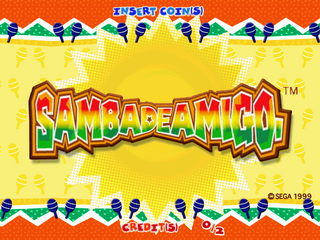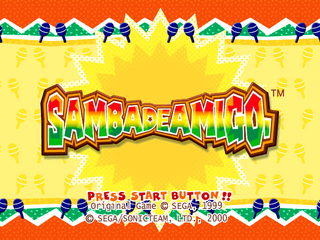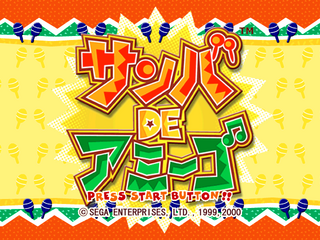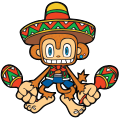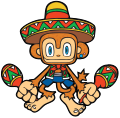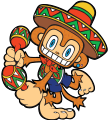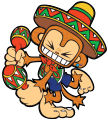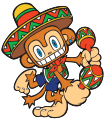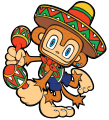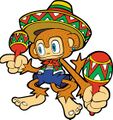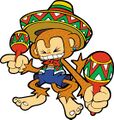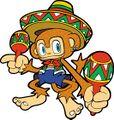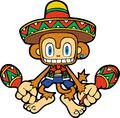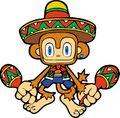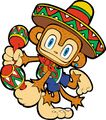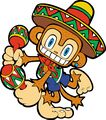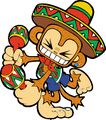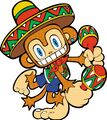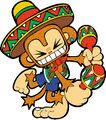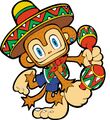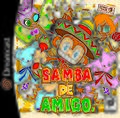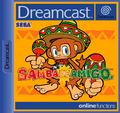Difference between revisions of "Samba de Amigo"
From Sega Retro
Hyperspeed34 (talk | contribs) |
m (Text replacement - "==Technical information== {{mainArticle|{{PAGENAME}}/Technical information}}" to "==Compliance== {{mainArticle|{{PAGENAME}}/Compliance}} ==Technical information== {{mainArticle|{{PAGENAME}}/Technical information}}") |
||
| Line 308: | Line 308: | ||
| item1name=Caution Pages | | item1name=Caution Pages | ||
}} | }} | ||
| + | |||
| + | ==Compliance== | ||
| + | {{mainArticle|{{PAGENAME}}/Compliance}} | ||
==Technical information== | ==Technical information== | ||
Latest revision as of 14:23, 23 December 2024
| This article needs to be rewritten to too sloppy, needs to be rewritten by someone more informed. This article needs to be rewritten to conform to a higher standard of article quality. After the article has been rewritten, you may remove this message. For help, see the How to Edit a Page article. |
- For the Wii game, see Samba de Amigo (Wii).
| Samba de Amigo | |||||||||||||||||||||||||||||||||||||||||||||||||||||
|---|---|---|---|---|---|---|---|---|---|---|---|---|---|---|---|---|---|---|---|---|---|---|---|---|---|---|---|---|---|---|---|---|---|---|---|---|---|---|---|---|---|---|---|---|---|---|---|---|---|---|---|---|---|
| System(s): Sega NAOMI, Sega Dreamcast | |||||||||||||||||||||||||||||||||||||||||||||||||||||
| Publisher: Sega Enterprises, Ltd. | |||||||||||||||||||||||||||||||||||||||||||||||||||||
| Developer: Sega Software R&D Dept. 8 (Sonic Team) Sega Software R&D Dept. 8 (Sonic Team) (JP) Sonic Team (US,EU) | |||||||||||||||||||||||||||||||||||||||||||||||||||||
| Peripherals supported: Dreamcast Modem, Samba de Amigo Maracas, Visual Memory Unit, Dreamcast VGA Box | |||||||||||||||||||||||||||||||||||||||||||||||||||||
| Genre: Rhythm Action (リズムアクション)[1][2], Table[3] | |||||||||||||||||||||||||||||||||||||||||||||||||||||
| Number of players: 1-2 | |||||||||||||||||||||||||||||||||||||||||||||||||||||
|
Samba de Amigo (サンバ DE アミーゴ) is a video game developed by Sonic Team. It was originally released in 1999 by Sega Enterprises, Ltd. for the Sega NAOMI arcade platform, before seeing a port to the Sega Dreamcast a year later. The Dreamcast version was designed to be used with the Samba de Amigo Maracas.
Contents
Gameplay
A rhythm video game similar in theme to Dance Dance Revolution, Samba de Amigo is played with a pair of maracas. As a song plays, the player (guided by on-screen graphics) must shake the maracas at high, middle, or low heights with the beat of the music, or occasionally must strike poses with the maracas held in various positions. The player is represented on-screen by a grinning monkey with a square head and a sombrero, Samba. If the player does well, the scene around Samba (usually a concert or a dance) will attract more people and become more vividly animated; if the player does poorly, characters leave and eventually all that's left is the monkey alone, looking sad.
In the primary game mode, each player has six spots arranged in a circle on the screen: two red meaning 'shake high,' two yellow meaning 'shake middle,' and two green meaning 'shake low.' Blue dots will appear in the center of this circle and move towards the spots; as soon as the blue dot touches a spot, the player must shake a maraca at that location. For example, if a blue dot touches the upper left spot, the player must shake either maraca above his left shoulder. Occasionally a long line of dots will flow into a spot and the word 'Shake' appears, telling the player to continue shaking his maraca rapidly there. Sometimes a stick-figure (named "Pose-kun") appears on the screen holding its maracas in a certain position; the player has a second or two to match the figure's pose for points.
Music
Licensed
| Track name | Artist | Original release date | Comments |
|---|---|---|---|
| "Ali Bombaye"/"The Theme of Inoki" | Michael Masser | 19xx | |
| "Al Compás Del Mambo"/"Mambo Beat" | Perez Prado | 1950 | |
| "The Cup of Life" | Ricky Martin | 1998-03-09 | |
| "El Ritmo Tropical" a.k.a. "El Bimbo" | Dixies Gang | 1999 | |
| "El Mambo" | Solemar | 1998 | |
| "La Bamba" | Ritchie Valens | 1958 | This is the cover by Ritchie Valens from 1958. The earliest confirmed recording dates back to 1939, but as a Mexican folk song it is likely much older. |
| "Livin' la Vida Loca" | Ricky Martin | 1999-03-23 | |
| "Macarena" | Los del Río, Bayside Boys | 1995-08-15 | This is the more widely known English language version from 1995. The original Spanish version dates back to 1993. |
| "Mas que Nada" | Jorge Ben | 1963-01-10 | |
| "Samba de Janeiro" | Bellini | 1997-05-05 | |
| "Soul Bossa Nova" | Quincy Jones | 1962-09-07 | |
| "Take on Me" | Reel Big Fish | 1998 | This is a ska cover of A-ha's 1984 hit. |
| "Tequila" | The Champs | 1958-01-15 | |
| "Tubthumping" | Chumbawamba | 1997-08 |
Original
| Track name | Comments |
|---|---|
| "Love Lease" | |
| "Samba de Amigo" |
From other Sega games
The Dreamcast version of Samba de Amigo allowed users to connect to the internet and "download" songs from other Sega games. These are thought to already exist on the disc - it was more of a means of getting people to go online.
| Track name | Game | Comments |
|---|---|---|
| "After Burner" | After Burner | |
| "Burning Hearts" | Burning Rangers | |
| "Can You Become Rent A Hero For Mankind's Sake?" | Rent A Hero No.1 | Samba de Amigo debuted on the Dreamcast about a month before Rent A Hero No.1, meaning this track could be heard by the public before the game could be played. |
| "Dreams Dreams" | NiGHTS into Dreams | |
| "Magical Sound Shower" | OutRun | |
| "Opa-Opa!" | Fantasy Zone | |
| "Open Your Heart" | Sonic Adventure | |
| "Sonic - You Can Do Anything" | Sonic the Hedgehog CD | |
| "Super Sonic Racing" | Sonic R |
History
Development
The game began development as a soccer game envisioned by director Shun Nakamura. It gradually into a game themed around Brazil before settling on a samba them.[16] The game was titled Samba de Amigo early into development, and only coincidentally resembles the song "Samba de Janeiro".[16]
Tomohiko Aita, a new recruit who previously worked with director Nakamura on ChuChu Rocket!, was chosen to design the game as he had become known as the "Amazing Samba Guy" from his Sega job interview.[16].
The game officially started development in July 1999[16]. The working prototypes of the arcade's maraca controllers, developed by Sega Mechatro, were completed in August 1999.[16] The game was first demo's at the Amusement Machine Show 1999 2 weeks later, which made for a quick turnaround to integrate the controllers into the game, and licensing for several songs was only cleared a night before the show.[16] This was followed by various location tests, which were incredibly successful compared to what other people at Sega expected, incentivising and increase in the game's marketing budget.[16] Despite how tight development had seemed at first, the software was completed before the maraca controllers were, resulting in the developers at Sonic Team taking an Autumn break, after which they returned to work out bugs and finalise licensing agreements with musicians.[16]
Release
Despite being built around the idea of using maracas, 30,000 copies of the Dreamcast game were initially shipped to North America, but only 10,000 maraca controllers[17]. Only 3,000 copies were set to be produced for the UK[12].
Legacy
Samba de Amigo has not seen any direct "sequels", but has had a number of updates over the years. The first being Samba de Amigo Ver. 2000, also on Sega NAOMI hardware and the Sega Dreamcast.
A Wii version was released in 2008. Sega Logistics Service announced it would end service on Samba de Amigo arcade machines on March 31, 2017.[18][19]
Awards
Samba de Amigo was named Best Puzzle Game of 2000 by GameSpot. It also was nominated for the Excellence in Audio award and for a Game Spotlight Award in the 1st annual Game Developers Choice Awards.
Versions
Dreamcast version adds a "party mode," with minigames such as Guacamole (pronounced and played much the same as "whack-a-mole"), Strike A Pose (consisting of a long sequence of poses to make), and 1-2-Samba! (where spots must be hit in sequence - the Japanese version's name for this minigame, "Ichi Ni San-ba," is a pun on counting to three in Japanese). The home version also has features which can be unlocked, such as sound effects and hidden songs. Hidden songs include themes from other Sega games such as Sonic Adventure and OutRun.
For Dreamcast version, the Sega maracas controllers are red, and the rattle part can be unscrewed from the top of each for quieter play. Each maraca has a cord which is plugged into to a bar that lays in front of the player's feet. The bar is slightly more than two feet in length and has a sensor at each end, and each maraca has an infrared transmitter mounted on its cord; presumably this allows the system to triangulate the position of each maraca as the player holds it. The game can also be played with the standard Dreamcast controller, but this makes the game trivial to play.
Production credits
- Main article: Samba de Amigo/Production credits.
Magazine articles
- Main article: Samba de Amigo/Magazine articles.
Promotional material
Artwork
(colour errors from EPS -> SVG conversion)
Physical scans
NAOMI version
| NAOMI, World | ||||
|---|---|---|---|---|
Dreamcast version
| Sega Retro Average | |||||||||||||||||||||||||||||||||||||||||||||||||||||||||||||||||||||||||||||||||||||||||||||||||||||||||||||||||||||||||||||||||||||||||||
|---|---|---|---|---|---|---|---|---|---|---|---|---|---|---|---|---|---|---|---|---|---|---|---|---|---|---|---|---|---|---|---|---|---|---|---|---|---|---|---|---|---|---|---|---|---|---|---|---|---|---|---|---|---|---|---|---|---|---|---|---|---|---|---|---|---|---|---|---|---|---|---|---|---|---|---|---|---|---|---|---|---|---|---|---|---|---|---|---|---|---|---|---|---|---|---|---|---|---|---|---|---|---|---|---|---|---|---|---|---|---|---|---|---|---|---|---|---|---|---|---|---|---|---|---|---|---|---|---|---|---|---|---|---|---|---|---|---|---|---|
|
| 85 | |
|---|---|
| Based on 27 reviews | |
Compliance
- Main article: Samba de Amigo/Compliance.
Technical information
- Main article: Samba de Amigo/Technical information.
External links
- Sega of America webpage: Dreamcast
- Sega of Japan catalogue pages (Japanese): Dreamcast
- Official sound webpage on wave-master.com
References
- ↑ File:Samba dc jp back cover.jpg
- ↑ 2.0 2.1 2.2 http://sega.jp/dc/000401/ (Wayback Machine: 2014-08-05 19:24)
- ↑ https://sega.jp/history/hard/dreamcast/software.html (Wayback Machine: 2020-11-07 20:31)
- ↑ Sega Arcade History, Enterbrain, page 170
- ↑ 5.0 5.1 https://sega.jp/history/hard/dreamcast/devices.html (Wayback Machine: 2020-02-10 03:52)
- ↑ http://www.sega.com:80/games/dreamcast/post_dreamcastgame.jhtml?PRODID=193 (Wayback Machine: 2003-12-11 12:55)
- ↑ http://www.ebworld.com/ebx/categories/newReleases/morenr-DC.asp (Wayback Machine: 2000-11-09 20:26)
- ↑ Press release: 2000-10-17: Sega Delivers a Fiesta of Fun to Dreamcast Players With Samba de Amigo
- ↑ 9.0 9.1 GamePro, "January 2001" (US; 200x-xx-xx), page 107
- ↑ http://www.chipsworld.co.uk/detProd.asp?ProductCode=3126 (Wayback Machine: 2001-04-15 18:54)
- ↑ http://www.amazon.co.uk:80/exec/obidos/tg/browse/-/300723/ (Wayback Machine: 2002-09-17 15:38)
- ↑ 12.0 12.1 DC-UK, "January 2001" (UK; 2000-12-14), page 31
- ↑ 13.0 13.1 13.2 Dreamcast Magazine, "No. 16" (UK; 2000-11-30), page 48
- ↑ Official Dreamcast Magazine, "January 2001" (UK; 2000-11-30), page 71
- ↑ http://www.centromail.es/top/ficha.asp?codmail=15884&codprov= (Wayback Machine: 2001-09-17 04:35)
- ↑ 16.0 16.1 16.2 16.3 16.4 16.5 16.6 16.7 http://www.wave-master.com/samba/ (Wayback Machine: 2002-08-08 18:11)
- ↑ Edge, "October 2000" (UK; 2000-09-11), page 18
- ↑ File:SegaProductsTerminationAnnouncement 2016-11 JP.pdf
- ↑ File:SegaProductsTerminationAnnouncement 2016-12.pdf
- ↑ Neo Plus, "Kwiecień 2001" (PL; 2001-xx-xx), page 100
- ↑ Neo Plus, "Maj 2001" (PL; 2001-xx-xx), page 100
- ↑ Neo Plus, "Czerwiec 2001" (PL; 2001-xx-xx), page 100
- ↑ Neo Plus, "Lipiec-Sierpień 2001" (PL; 2001-xx-xx), page 84
- ↑ Neo Plus, "Wrzesień 2001" (PL; 2001-xx-xx), page 84
- ↑ GamesMaster, "September 2000" (UK; 2000-08-08), page 80
- ↑ 576 Konzol, "Április 2001" (HU; 2001-xx-xx), page 42
- ↑ Alaab Alcomputtar, "" (SA; 2001-xx-xx), page 31
- ↑ Click!, "4/2001" (PL; 2001-02-15), page 49
- ↑ Consoles Max, "Janvier 2001" (FR; 200x-xx-xx), page 96
- ↑ Consoles +, "Janvier 2001" (FR; 200x-xx-xx), page 72
- ↑ Computer & Video Games, "August 2000" (UK; 2000-07-12), page 126
- ↑ Computer & Video Games, "February 2001" (UK; 2001-01-17), page 108
- ↑ DC-UK, "August 2000" (UK; 2000-07-06), page 84
- ↑ Dorimaga, "2002-18 (2002-10-11)" (JP; 2002-09-27), page 33
- ↑ Edge, "July 2000" (UK; 2000-06-21), page 94
- ↑ Electronic Gaming Monthly, "January 2001" (US; 2000-12-05), page 195
- ↑ Entsiklopediya igr dlya Dreamcast, "Izdaniye chetvertoye, dopolnennoye" (RU; 2002-xx-xx), page 193
- ↑ Fun Generation, "07/2000" (DE; 2000-06-21), page 92
- ↑ GameFan, "Volume 8, Issue 7: July 2000" (US; 2000-xx-xx), page 18
- ↑ GameFan, "Volume 8, Issue 12: December 2000" (US; 2000-1x-xx), page 25
- ↑ Game Informer, "December 2000" (US; 2000-1x-xx), page 126
- ↑ Gamers' Republic, "December 2000" (US; 2000-xx-xx), page 92
- ↑ MAN!AC, "01/2000" (DE; 2000-12-06), page 78
- ↑ Mega Fun, "09/2000" (DE; 2000-08-02), page 62
- ↑ Next Generation, "August 2000" (US; 2000-07-18), page 90
- ↑ Official Dreamcast Magazine, "January 2001" (UK; 2000-11-30), page 68
- ↑ Official Dreamcast Magazine, "Holiday 2000" (US; 2000-11-28), page 94
- ↑ Sega Magazin, "September 2000" (DE; 2000-07-31), page 20
- ↑ Strana Igr, "Sentyabr 2000 2/2" (RU; 2000-xx-xx), page 20
- ↑ Video Games, "01/2001" (DE; 2000-12-06), page 64
| Samba de Amigo | |
|---|---|
|
Main page | Comparisons | Credits | Development | Magazine articles | Reception | Technical information | Bootlegs
Music: Samba de Amigo Presents Samba de Janeiro Non-Stop Best of Bellini (2000) | Samba de Amigo (2001)
Demos: Samba de Amigo Taikenban (2000) | |
| Games in the Samba de Amigo Series | |
|---|---|
| Samba de Amigo (1999) | Samba de Amigo Ver.2000 (2000) | |
| Samba de Amigo (2001) | Samba de Amigo (2002) | Amigo-kun no Doki Doki Aishou Check (2002) | |
| Samba de Amigo (2008) | |
| Samba de Amigo: Party Central (2023) | |
| Samba de Amigo: Party-To-Go (2023) | |
| Samba de Amigo related media | |
| Samba de Amigo Presents Samba de Janeiro Non-Stop Best of Bellini (2000) | Samba de Amigo (2001) | Samba de Amigo Original Songs Collection ~Party! Party! Party!~ (2023) | |
| Samba de Amigo The Greatest Guidebook (2000) | |
- Pages Needing to be Rewritten
- Dreamcast Modem-compatible games
- Dreamcast VGA Box-compatible games
- Visual Memory Unit-compatible games
- 1-2 player games
- All arcade games
- NAOMI games
- 1999 NAOMI games
- All 1999 games
- JP Dreamcast games
- All JP games
- US Dreamcast games
- All US games
- EU Dreamcast games
- All EU games
- DE Dreamcast games
- All DE games
- ES Dreamcast games
- All ES games
- FR Dreamcast games
- All FR games
- UK Dreamcast games
- All UK games
- Dreamcast games
- 2000 Dreamcast games
- All 2000 games
- Dreamcast table games
- All table games
- Dreamcast games with ADX audio
- Dreamcast games using Flash
- All games
- Old-style rating (gamesmaster)
- Update ratings template
- 1 old ratings
- Samba de Amigo
- Samba de Amigo (franchise)
